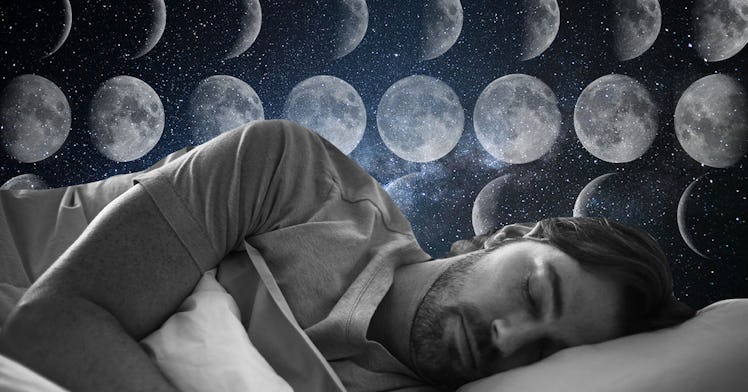Some Phases Of The Moon Mess With Men’s Sleep, Study Says
Although women weren’t affected by the lunar cycle, men in the study had trouble sleeping when the moon was waxing, or when the bright part was getting bigger.

The full moon gets a bad rap. For millennia, humans have blamed the midpoint of the lunar cycle for bouts of insomnia, outbreaks of delusion, and, of course, mythical shape-shifting. But while the jury’s still out on werewolves, a new study gives scientific cred to the superstition that the moon messes with sleep. Researchers found that men slept poorly during the lunar waxing phase — when the bright side of the moon was getting better — compared with the waning phase. But the moon didn’t rouse women either way.
Several past studies have focused on untangling the relationship between sleep and the lunar cycle with varying results. One discovery published earlier this year showed that people often have trouble falling asleep or sleeping through the night in the days leading up to a full moon.
“I thought — hm, this is kind of interesting,” says Christian Benedict, a professor of neuroscience at Uppsala University in Sweden of this previous study. He decided to follow up on that research with the new study, which looks beyond just the full moon using data collected by his colleague Eva Lindberg, a professor in medical sciences at Uppsala University.
Over a period of several years, Lindberg had collected overnight data from 360 men and 492 women as part of a sleep apnea study. She had measured her subjects’ sleep using a technique called polysomnography, “the gold standard” in sleep studies, Benedict says. A participant is hooked up to several machines that continuously track their brain activity, heart rhythm, and muscle and eye movements over the course of a night’s sleep.
With this massive dataset in hand, Benedict mapped the lunar cycle onto each of the 852 sleep readings, lining up the calendar date of the sleep recordings with the moon phase that evening. When he analyzed the data, he didn’t look for anything in particular. “I let the data speak to me,” Benedict says.
Speak to him it did. When Benedict focused on differences between the waxing and waning halves of each lunar cycle, he found a curious pattern: “The effect was different between males and females.” Men who had their sleep recorded during the waxing phase, when the moon is becoming fuller, didn’t sleep as well as those who went in for their tests during the waning phase, when it’s getting closer to a new moon. Women weren’t affected by the lunar cycle either way.
The resulting study, published in the journal Science of the Total Environment, is only correlative and can’t conclusively determine that a waxing moon messes up a man’s sleep. But Benedict has a few guesses as to what’s going on.
Previous research has shown that men’s brains are more responsive to ambient light than women’s brains. As the waxing moon becomes bigger each night in the lunar cycle, it produces more and more light. “Males may have had more issues in the waxing period because they were more sensitive to the light reflected by the moon back to Earth,” Benedict explains.
Our hunter-gatherer ancestors could have adapted sensitivity to the waxing moon because its bright light gave them more opportunities to hunt. Or they may have been more vulnerable to predators under the brightening light of the waxing moon, so men who served as protectors may have evolved this wakefulness to help them defend their people.
So should men double up on the melatonin gummies when the moon is waxing? Not so fast. “The equation of sleep contains so many variables,” Benedict says. “The moon is just one of them.”